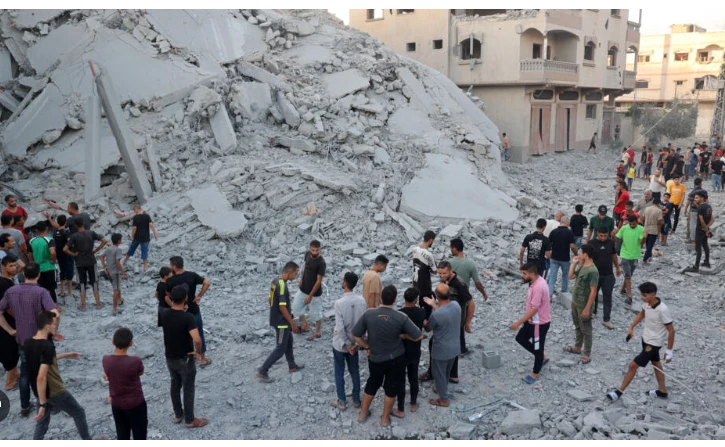Border corridor becomes sticking point in Gaza truce talks

Stay tuned with 24 News HD Android App

A narrow stretch of land along the Gaza Strip's border with Egypt has emerged as the main stumbling block in negotiations for a ceasefire between Israel and Hamas.
Israeli Prime Minister Benjamin Netanyahu wants his country to permanently control the Philadelphi -- or Salaheddin -- Corridor, which it seized during the war sparked by Hamas's October 7 attack.
The patrol road protected by barbed wire runs for 14 kilometres (8.5 miles) along the border and is about 100 metres (330 feet) wide at its narrowest point, with tunnels said to be dug under it and used for smuggling .
It was built by the Israeli military when Gaza was under its direct occupation between 1967 and 2005, and has become a key target in Israel's current offensive against Hamas.
As Israeli negotiators hold talks in Cairo on a potential Gaza truce and hostage release deal, the Philadelphi Corridor has become the primary sticking point.
Netanyahu contends that Israeli control is necessary "in order to prevent Hamas from rearming itself", a statement from his office said on Thursday.
Hamas, which is not attending the latest round of talks in Egypt, demands a complete Israeli withdrawal from Gaza.
A high-ranking Egyptian official this week similarly called for a "complete withdrawal of Israeli troops from the Philadelphi Corridor and the Palestinian Rafah terminal" -- a key crossing on Gaza's border with Egypt.
A 2005 agreement between Israel and Egypt established the corridor as a buffer zone, as part of Israel's unilateral withdrawal from the Gaza Strip that year.
It was meant to facilitate control over movement in and out of Gaza and discourage incursions and smuggling.
Some houses had to be demolished to make way for the corridor, which has also accentuated the division between the Gaza side of Rafah, in the territory's far south, and the town's Egyptian side -- a remnant of British colonial policies.
- Tunnels -
When Israeli troops withdrew from Gaza in September 2005, Egypt set up a force dedicated to guarding the border with around 750 personnel.
To avoid breaching demilitarisation clauses in the 1979 Israeli-Egyptian peace treaty, the Egyptian force's stated purpose was to fight "terrorism" in the area.
On the Gaza side, Palestinian president Mahmud Abbas -- whose Palestinian Authority ruled the territory at the time -- deployed guards to secure the Philadelphi Corridor.
But in June 2007, militant group Hamas seized control of the Gaza Strip after rivalry with Abbas's Fatah party prevented the Islamist movement from assuming the leadership despite a landslide election win .
The border area subsequently became the focus of growing concern about arms trafficking, which fed the arsenal of local armed groups.
Hundreds of tunnels are said to have been dug under the Philadelphi Corridor that have been used for smuggling everything from weapons to cars, drugs and even food like Kentucky Fried Chicken.
According to international organisations, armed fighters have criss-crossed through these underground routes, while smugglers have facilitated the travel of civilians for varied reasons -- including medical appointments and attending weddings.
For Palestinians, the tunnels have been a way of getting around the Israeli land, sea and air blockade imposed on the entire Gaza Strip when Hamas seized power .
When Egyptian President Abdel Fattah al-Sisi came to power in 2013, Cairo moved to destroy many of the tunnels, accusing Palestinian militants of using them to smuggle arms and fighters to jihadist groups in the neighbouring Sinai Peninsula.
Last week the Israeli military announced it had destroyed some 50 tunnels under the Philadelphi Corridor.
Since the start of the Israel-Hamas war after the October 7 attack, Netanyahu has stressed the strategic importance of the border area.
In May, the Israeli military said it had assumed "operational control" of the route.
Diaa Rashwan, head of the Egyptian government's State Information Service, in January told pan-Arab news channel Al-Ghad that such an "occupation" was "forbidden by virtue of the agreement" between the two countries.
It would even constitute a "threat of violation of the Israeli-Egyptian peace treaty", Rashwan said.
The US-brokered 1979 agreement was the first peace treaty between Israel and an Arab country.
burs-tgg-crb-lba-jd-rcb/dr
© Agence France-Presse
